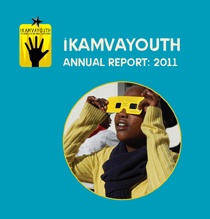

IkamvaYouth’s 2011 Annual Report is out and available here for download!
Many thanks to our super-talented designer Lynne Stuart, to Julia de Kadt for proofreading, and to everyone who contributed stories, quotes and photos. We love it, and hope that all the readers will too!
Ikamvanites got through some really rough times in 2011: our office was petrol-bombed, a devastating fire in Masiphumelele destroyed 1000s of homes, and learners spent a week rioting after their classmate was badly injured while beaten at school. 2011 was also a year of tragic loss: three heroes (Mphumzi Klaas, Nomzamo Kali and Dave Eadie) all passed away before their time, but not before they’d each made significant contributions to IkamvaYouth and South Africa at large.
There were some good times too: 560 ikamvanites (learners & volunteers) spent their holidays at one of the five winter schools (hosted by TSiBA, UWC, Masi library, DUT and SEF), and 426 learners achieved more than 75% attendance, three times a week, through all four terms. 100 tutors regularly spent their spare time tutoring at the five branches. The ikamvanites’ hard work paid off: 99% of learners in grades 8-11 passed onto the next grade, and 85% of our matrics passed (41% Bachelor, 39% Diploma passes). 69% of matriculants are at tertiary institutions, and 9% are in learnerships and/or employment.
IkamvaYouth’s track record of impressive results has led to some important and exciting attention. We were visited by the Minister of Basic Education (twice!) and mentioned in her budget speech; the Duchess of Cornwall popped in, and Jonathan Jansen inspired our learners at the Masi branch. We were featured in national media including Business Day, SAFM and SABC2 and MNet, made our own Live magazine, went to Slovenia and won a bunch of awards.
A key organisational objective for 2011 was consolidation, and despite the challenges, we’ve managed to achieve this; thanks to the support from our visionary donors. We ran our first-ever national strategic planning week (when many of us met the colleagues with whom we collaborate online on a daily basis in person for the first time); open-sourced our model through the ikamvanitezone (where you’ll find shared information and resources, how-to guides, tools & templates); had an independent evaluation conducted by Servaas van der Berg and his team of education economists, and grew our team.
Over the past year, IkamvaYouth has received 28 requests from communities in all provinces to establish more branches. And after our year of heads-down consolidation, we’re ready to step up and respond. 2012 has seen two new branches established: African- Bank-funded Ivory Park and ABI-funded Umlazi. Next on the horizon are Grahamstown and another two Gauteng branches. We’ve also begun thinking about ways to generate income and sustainably scale expansively, without entirely relying on donor funding in the future.
Ultimately though, IkamvaYouth’s sustainability lies with the ikamvanites. During our first few years, people would often tell us sagely that “initiatives that rely completely on volunteers aren’t sustainable”. We don’t get that anymore. And indeed, ikamvanites have shown that not only is the model sustainable due to the learners becoming tutors, and the tutors being so committed, but that volunteers produce results in contexts where few can.
We invite you to get involved in whatever way, and be a part of the change we need in many more communities throughout the country.
We hope you’ll enjoy the 2011 Annual Report multi-media experience we’ve curated for you, and make the most of the hyperlinks providing detail behind the headlines to youtube clips, blog posts and reports.
Thanks again to every indivdual who played your part in enabling all that was achieved and overcome in 2011, and to those who’re boosting us to ramp it up for 2012!
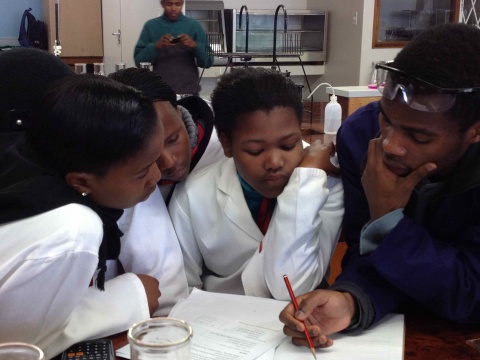
Winter school snuck up on us this year, and not in an unassuming king of way, kind of when a loud bang goes off next to you when you least expecting it kind of way Yes… just like that!
160 learners, 40 tutors, 3 busses and loads of enthusiasm, excitement and passion charged their way down the N2 to UCT Middle Campus for 10 days of learning, discovering and fun.
It’s hard to believe what we work so hard to plan for months before all ends seemingly faster than when it began! And with SO many amazing workshops, challenging tutoring times and passion from all the volunteers and learners it’s hard to give an overview of what happened this year, but I’ll try!
– Grade 11 and 12 chemistry workshops in the UCT Chemistry Labs – facilitated by Thobela Bixa, check out his incredible achievement here

– Tutoring for all the grades working through past exam papers and Answer Series books. With over 40 volunteers we achieved a ratio today of 1:4 learners per tutor! Talk about an intense time!
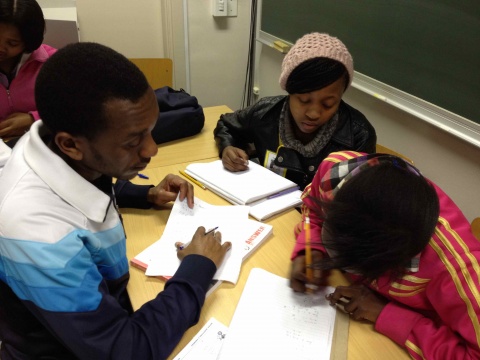
– PSH (Peers in Sexual Health) ran self-awareness workshops, while Sunstep got involved making alarms and facilitating other experiments with physics students.
– Rose, a volunteer from Stanford is working this week on a photography workshop, while other students got involved in deep debate.
– Andreas and his team from ERM, and Matthew from Cape Leopard Trust made sure the students got to grips with our environment, learning about how to make their immediate environment more sustainable, going for walks in Tokai forest finding a few wild animals along the way..
– Capitec ran some financial literacy training workshops, have a read about how they went here
– Nadia ran a very creative workshop where learners molded their own pots from clay (a little messy, a LOT of fun)
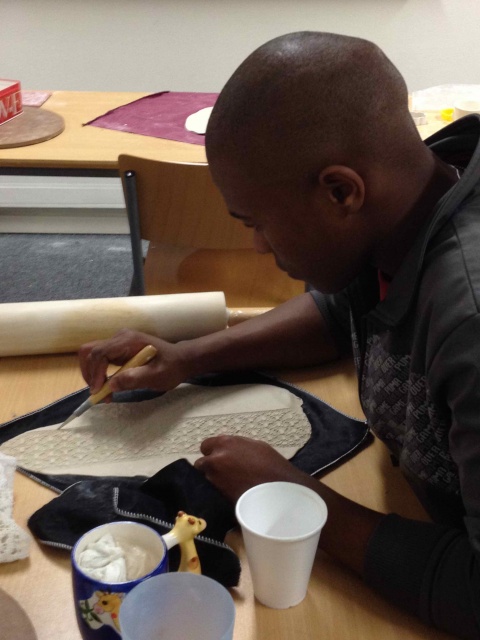
– Nkuli and the guys from Live Magazine were back this year for some photo shoot action, as well as creating content for their YouTube channel

– South African Astronomical Observatory ran workshops about what’s happening in our solar system, while the week ended off with Joy from UCT Wellness Centre putting our students through their dramatic paces presenting various health issues
Not to forget while this is all happening the Grade 11 & 12 students all ran through Operation Fikelela, a computer literacy program, while tutors set projects, homework and feedback sessions for all the grades.
Tuesday (26 June) in the first week also marked the one-year anniversary of the passing of Mphumzi Klaas, our friend, our confidant and a huge part of the Makhaza branch. We began the very emotional day with a very moving memorial service with a few people speaking, a video being show and most poignantly the choir singing moving the room to fresh tears as if one year ago was yesterday. And while the Ikamvanites once again balance grieving and all the madness that winter school brings, they did this instead of with incredible sadness and heavy hearts, but with a spirit of tenacity and perseverance they threw themselves into tutoring and workshops, with a renewed commitment to making this the best winter school possible, to show that through adversity and sadness, good can come, that people when united can make the impossible happen.
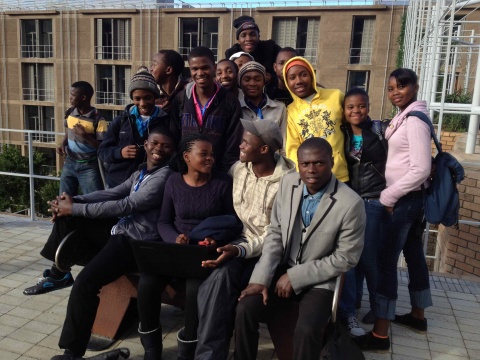
WOW! With so much happening, the biggest winter school IY has ever had finished with bang, and almost as fast as it arrived it was all over, classrooms packed up and cleaned, busses full to bursting on a day with some of the biggest downpour Cape Town has seen this winter, I can only begin to think of all the fun and excitement we can expect next year! Only after a loooooooooooong rest though…
A huge Huge HUUUUUGE thanks to ALL the workshop facilitators, tutors and learners – Your passion, commitment, excitement and leadership shown over these two weeks make this one of the best winter schools ever! Also to Lolita, Deidre and all that UCT for availing the space to us, BIG UP!!!
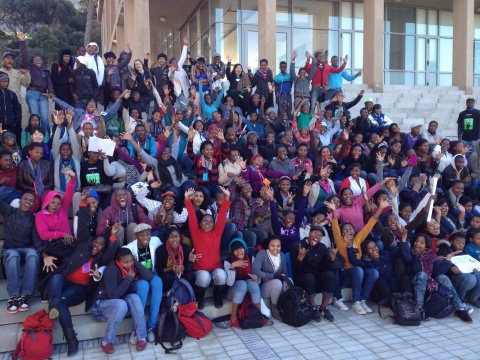
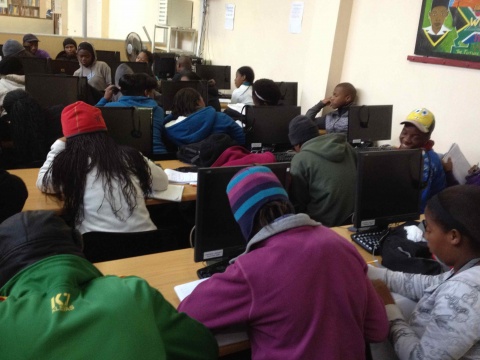
While all the Makhaza students enjoy the last week of their winter school holidays, taking a much needed break from the intense focused energy needed for winter school, the Western Cape matrics have given up their entire holiday to continue with tutoring, mentoring, exam preparation, and tertiary applications.
This week sees intensive academic writing and bursary application writing workshops being run by Rose and Francisca, two volunteers from Stanford university, as well as each matric filling out at least 5 application forms for tertiary. It’s only Wednesday and so far everyone has applied for UCT, TSiBA, UWC, CPUT, Northlink and a few for Stellenbosch University. All this interspersed with tutoring, tutoring and more tutoring (with the odd test thrown in..)
Big up matrics!! The end is nearly in sight, by giving up your holiday for this last gasp of intensive tutoring and mentoring it’s setting yourself up for a spectacular finish at the end of the year!
There are only a few days left, if you are interested in tutoring or mentoring the matrics, please email liesel@ikamvayouth.org, alternatively call Zukile on 021 362 6799

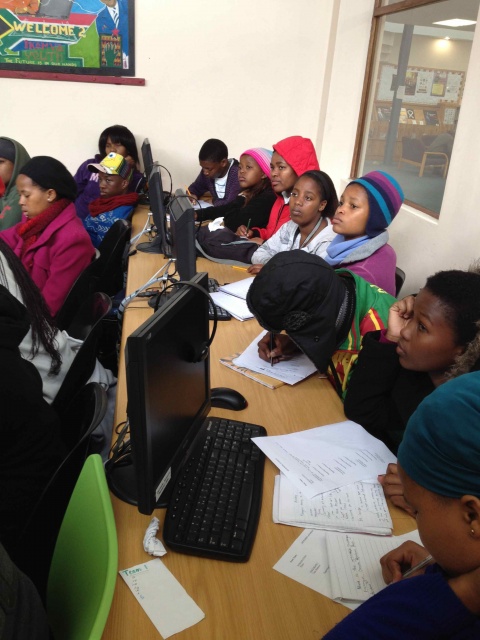
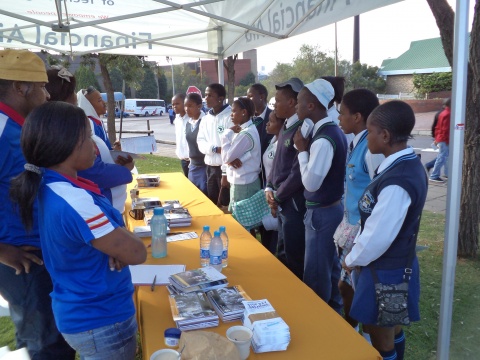
On Saturday the 12th of May, 25 Grade 12 learners were at the IkamvaYouth Ebony Park centre by 6:30am ready to attend the much awaited University Open Days. The Universities that had Open Days included Wits University, University of Johannesburg and Tshwane University of Technology. The learners arrived at the different Universities by 7:30 am and began to tour the University grounds and also began to interact with other learners from the universities as well as other High Schools. They toured around the different faculties and with the assistance of our very commited volunteers, the learners began to make some serious decisions about what they wanted to study in tertiary and see what they already qualified for with their current marks.

The Ikamvanites enjoyed the whole experience and said that it gave them a chance to interact with people from all over the country and also get a perspective of what university life is like from the university students. Dikamatso, an Ikamvanite from Tsosolotso High School said that it was a great motivator to see what they saw and experience all they experienced. The end result of the day was that the Ikamvanites decided to continue to take their future into their own hands by collecting the application forms and bursary applications. The Matriculants all understand that by failing to prepare they are already preparing themselves to fail, therefore preparation is very essential.
We look forward to succcessful Grade 12’s this year and the IY team would like to continue to thank the loyal volunteers who have committed themselves to helping all our learners.
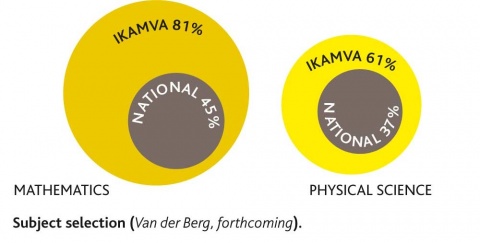
IkamvaYouth is pleased and proud to announce the publication of Against the odds: An evaluation of the IkamvaYouth programme, by a team of economists at the University of Stellenbosch. Servaas van der Berg and his team conducted an in-depth evaluation of IkamvaYouth, by administering questionnaires and interviewing 828 ikamvanites (past and present).
The full report is available here for download, and contains a wealth of information, results, analysis, quotes from ikamvanites and recommendations for improvements and scale.
Some of the findings have validated the results we’ve reported via our own tracking (see below). However, there were also some new and interesting findings, including:
- Insight into ikamvanites’ wealth and living standards
- Only 38% of ikamvanites live with their parents; 45% sometimes go to bed hungry; only 31% have their own desk or table at home and 65% have their own bed.
- 22% of mothers have matric and 11% have some post schooling
- 15% of fathers have matric and 9% have some post schooling; 32% of fathers’ education levels are unknown
- Matric results as compared with those of our feeder schools
- Detail regarding learners’ choosing Maths and Science and their performance in these most-challenging subjects
- “An overwhelming majority (81%) of Ikamva students in 2011 elected to do Mathematics, versus less than half of all candidates nationally. For Physical Science too, far more Ikamvanites chose this difficult option. Reponses to the survey indicate that similarly high proportion of former Ikamva students had elected these two subjects: 78% wrote Mathematics and 54% Physical Science.”
- “The difficulty of these subjects can be gauged from the fact that nationally, the pass rate (at 30%) is 46% and 53% for these two subjects respectively, much lower than for other electives such as Geography (70%) or History (76%), despite the fact that the candidates in these first two subjects are a far more select group in terms of academic ability. This ambitious subject choice is even more exceptional when compared to learners from similar (mainly township) schools. Ikamva’s encouragement of learners to take these more difficult subjects necessarily affects the relative pass rates and the subject performance of Ikamva learners negatively, thus the need to carefully consider this when evaluating Ikamva learners’ results.”
- “61% of all Ikamva matric candidates wrote and passed Mathematics, as against only 21% for all South African matric candidates.3 The proportion of all Ikamva matric candidates who achieved 40% or more was 28% versus 14% for all South African candidates. Compared to similar communities the Ikamva performance in this regard would even be more impressive than this.”
- ” What Ikamva thus successfully manages to do is to encourage learners from across the ability spectrum to raise the bar, by entering for subjects which the typical student from weak schools would usually avoid, and then to achieve success which is at least comparable to that achieved by candidates that often are more selected in terms of ability and from higher socio-economic groups. This is a truly impressive achievement.”
- The good results are consistent: “average results differ little between branches”
- The programme is very highly regarded by our learners and ex-learners (they do tell us these things, but it means a great deal more when told to independent evaluators)
- “The evaluation team is confident that Ikamva’s short term impact is considerable. This lies not only in the improved matric performance, but even before that in helping to create an environment where children from often very disadvantaged circumstances feel a sense of belonging and that someone cares about their needs and ambitions. That alone is a very valuable contribution. The extent of this contribution cannot be measured, but is visible in the fact that Ikamva was so highly praised by all who participates in it, or have done so in the past. As an evaluation team we have not seen such universally high praise of an organisation before.”
- Insight into the “success factors” behind the IY model
- “The remarkably successful personal relationships that Ikamva has developed with participants, based on extremely sensitive interaction with learners, yet without undermining basic discipline: “Kickouts” still occur and learners know that they can only remain part of the “family” if they play their part.”
- The tutors: “They are largely volunteers and mostly young. The fact that many of them are former Ikamvanites say something about the glue that holds Ikamva together: A positive social context in an environment where many face harsh circumstances at home, in the labour market, schools, universities, and wider society. The link with Ikamva means much to them, and also provides some continuity in their lives. Also, they act as role models to learners, thus further strengthening the desire of learners to undertake tertiary studies. Their relative youth also means that communication with learners is easier, in contrast to what learners experience at school. The team found no evidence that the tutors were particularly well trained or that they were always much better teachers than those in schools; the commitment, positive interaction and additional time were apparently most important in the success of students, not the better teaching.”
- “The fact that Ikamva operates in metropolitan environments where there are universities close by is an important factor in its success. Without a strong volunteer base, the tutors would not have been available, and it would have been more difficult to build the passion for tertiary studies that drives many Ikamvanites.”
- “The most important factors in Ikamva’s success, however, appear to be its commendable organisation, good planning and the enthusiasm of those at the head of the organisation. This enthusiasm is contagious.”
- Matric results
- “85% of Ikamva candidates passed, against the 70% nationally, or put differently, that Ikamva’s failure rate of 15% was half of the national average. But the full extent of Ikamva’s performance success is not yet captured in simple pass or fail rates: What is quite impressive is Ikamva’s performance in terms of getting learners access to universities: 36% of Ikamva candidates, versus 24% nationally, obtained a so-called “Bachelor’s degree endorsement”, i.e. a pass that is considered by the Department of Basic Education as good enough for degree studies. This is what used to be referred to in the past as “university exemption”. Data on a race basis is not yet available for 2011, but to put the Ikamva performance in terms of potential university entry in perspective, it is worth considering that the proportion of black students who obtained such exemptions in 2007, the last year for which race data could be obtained, was only around 11%. Altogether 72% of Ikamva candidates passed with either Bachelor’s or a Diploma endorsement, i.e. could potentially attend a university for degree or diploma studies (some universities have stricter entry criteria, though), whilst this proportion is only 53% amongst matric candidates nationally.”
- Placement into post-school opportunities
- More than half of respondents who had matriculated whilst participating in Ikamva after matriculating (58% of the 119 such respondents in the survey) indicated that they had gone onto university studies, and another 14% that they had continued onto “college” (here interpreted fairly broadly as other post-school studies). This thus left only 28% who had not gone on to further studies.
Key recommendations which we’re currently considering carefully include:
- Find ways to support learners as they adjust to life at tertiary
- “Ikamva could, and should, find ways of assisting students to make the transition to university, both by assistance with the initial exposure to academic English that many respondents to the qualitative interviews found daunting, and by helping them to find support structures to reduce the anomy that they experience when starting at university. Ikamva would have to decide how much of this it wants to engage in itself (which is not its core activity), and how much can be done by assisting Ikamvanites to link to other institutions (e.g. NGOs and university structures) that could assist.”
- Provide more support to build proficiency in Academic English
- Scale cautiously:
-
“Given how important Ikamva’s leadership is in its success, one may well argue that it would be extremely difficult to scale up the activities, particularly across many more centres. The evaluation team has indeed expressed its reservations about that in previous interaction with Ikamva: It is easy for leadership to under-estimate the importance of its own role. A dilution of this leadership across a much bigger organisation may lead to the programme losing some its attractiveness to students. On the other hand, analysis shows little difference in performance between branches. This could be interpreted as that the success lies in the model, and not in the particular leadership at branch level. This would be consistent with a view that expansion could be attempted as long as good branch leadership can be found. A cautious approach may be to consider expansion only when there are good support structures and where good branch managers are available, but not to be over-ambitious. The strong central leadership capacity that Ikamva possesses for planning and organisation is an asset that could be built on and that may offer a solid foundation for expansion, but it should not be endangered by too rapid expansion. Also, expansion should retain the essentials of the existing model, which importantly includes proximity to a university environment, preferably in a metropolitan area. This limits scalability, but such a conservative stance may be appropriate.”
IkamvaYouth is greatly appreciative to the Evaluation team (Nic Spaull, Ronelle Burger, Cobus Burger, Chris van Wyk, Servaas van der Berg, Robert Dzivakwi and the fieldworkers), ikamvanite Phillip Mcelu for tracking down 95% of all ikamvanites (!), DGMT for making this possible, and to all the ikamvanites who participated in the survey and interviews.

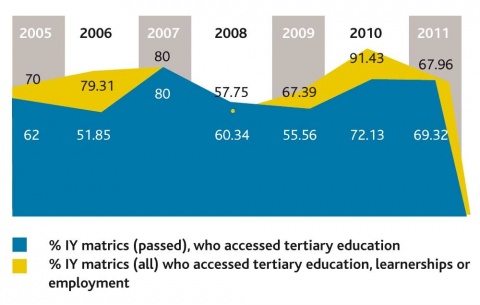
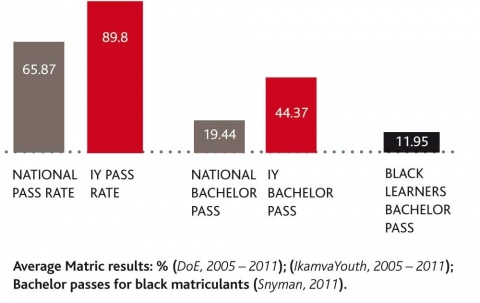
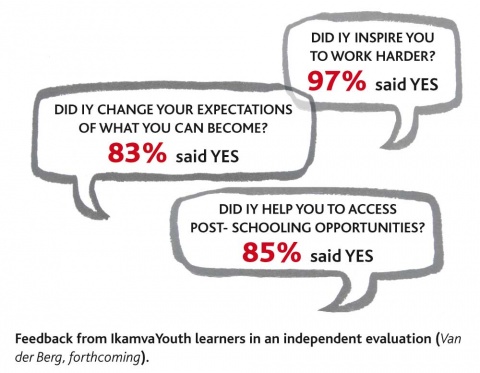
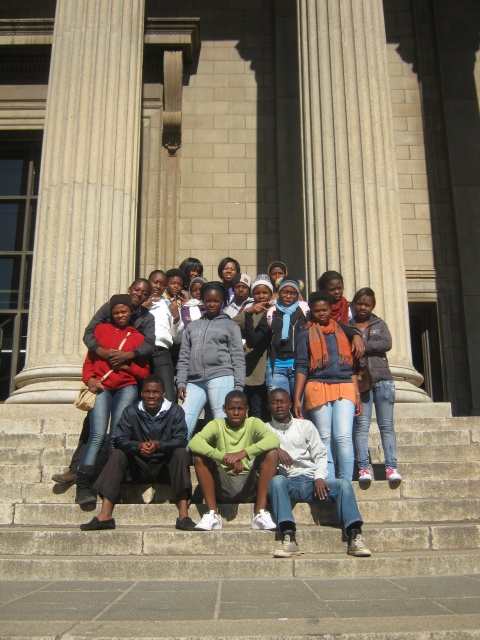
Learners from the class of 2011 have begun their journeys to ‘really bright futures’ and are paying-it-forward

Ivory Park outing to University of Wits 2011 – inspiring the leaders of tomorrow
I think I have a really bright future, thanks to everyone that has supported me… and myself!” Zintle Mtakati (Class of 2011, Masiphumelele Branch)
IkamvaYouth reported an 85% matric pass for its class of 2011 in January, but the organisation ultimately measures its impact in the number of learners who access post-school opportunities. 69% of IkamvaYouth’s matriculants have enrolled in tertiary education (including top institutions such as Wits, UFS and UCT), and overall, 97% of those who wrote the matric exams have accessed tertiary institutions, learnerships, employment, or are being supported to rewrite in 2012. 58% have transformed from beneficiaries into benefactors by becoming volunteer tutors and mentors for the next generations of learners.
The 2010 General Household Survey found that only 4,2% of South Africans aged 18 to 29 were enrolled at higher education institutions. Whereas 17,4% of white youth were enrolled at university, this was true for only 3,1% of black Africans and 3,5% of coloured persons (STATS SA, 2011). “The nation’s obsession with matric results is misplaced”, says IkamvaYouth director Joy Olivier. “It is only through access to post-school opportunities that the challenges of unemployment, poverty and inequality can begin to be addressed”. National coordinator Zamo Shongwe points out that “unfortunately, with the system struggling to deliver on the basics of literacy and numeracy, and most parents without the information or resources to assist their children, many young people are left stranded at this pivotal point in their lives”.
IkamvaYouth supports learners as they learn about, apply to, secure financial aid for, and enrol in universities, universities of technology, learnerships, internships and jobs. Every year since 2005 ikamvanites have achieved miraculous results, and once again, the low-cost / high-impact model’s effectiveness has been proven. Between 2005 and 2011, 66% of the programme’s 403 matriculants have enrolled in tertiary institutions. Overall, the peer-to-peer academic and social support system has ensured that 77% of matriculants since 2005 have enrolled in education, a learnership or a job 2.5 months following matriculation.
One ikamvanite who has been in the programme since 2009 has had to navigate a multitude of obstacles throughout her life including a lack of information, transport restrictions, and financial constraints. Her mother is HIV positive, works as a domestic worker and has brought her daughter up on her own. Now, she is studying for a BA in Human and Societal Dynamics at the University of the Free State on a full academic bursary, awarded by Jonathan Jansen.
The hard-working branch staff, volunteer tutors and mentors inspire and equip their learners to dramatically change the course of their lives. Two branches (Masiphumelele and Nyanga) had grade 12s for the first time, and their results are further evidence of the replicability of the model. The branches’ 2011 placement results are:
|
|
% matriculants accessing tertiary
|
% matrics overall who are writing supps/rewriting or accessing tertiary, learnerships, employment or rewriting
|
|
Makhaza
|
82%
|
100%
|
|
Nyanga
|
71%
|
100%
|
|
Masiphumelele
|
41%
|
100%
|
|
Chesterville
|
78%
|
95%
|
|
Ebony Park
|
82%
|
87%
|
Anathi Malindi, a Grade 12 from the Nyanga Branch, achieved a Bachelor pass in her exams and is now studying Analytical Chemistry at CPUT. Her mother was “so relieved and happy that her future is brighter now”. The majority of ikamvanites come from homes where one basic income supports an entire family, where unemployment, alcoholism and domestic violence are the norm, and access to university has hitherto been an idealised pipe dream. For ikamvanites it is becoming a reality. 83% of Ikamvanites surveyed in 2011 stated that IkamvaYouth had changed their expectations of what they could become. The fostering of self-belief and the support offered to learners truly allows them to proclaim that “today my life begins” (Anathi Malindi).
Placing learners at the centre of programme design and delivery ensures a lasting impact. Vuyiseka Melani, from the Nyanga branch, says “it’s not just the tutoring that makes us attend Ikamva, but the support and the love we receive from all the tutors”. IkamvaYouth works with learners in grades 8 to 12 to ensure that they do not become part of the growing cohort of unemployed and uneducated youth. As each matriculating year exceeds their own and others’ expectations, more are inspired to become volunteer tutors themselves. The organisation’s consistently impressive track record has attracted new supporters, staff and volunteers, enabling the organisation to establish two new branches (Ivory Park in Gauteng and Umlazi in KZN) and enroll 711 learners across the country in 2012.
The ikamvanites are inspirational examples of young people becoming agents of their own change and the architects of their own futures. The organisation is calling out to anyone and everyone to join and enable further success breeding success. Join us and lift as you rise!

















 Lloyd Lungu
Lloyd Lungu